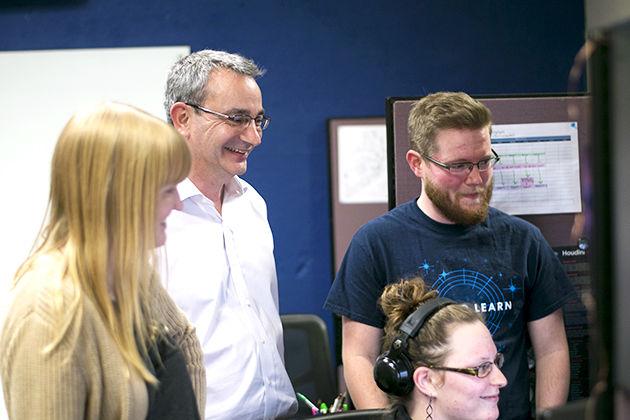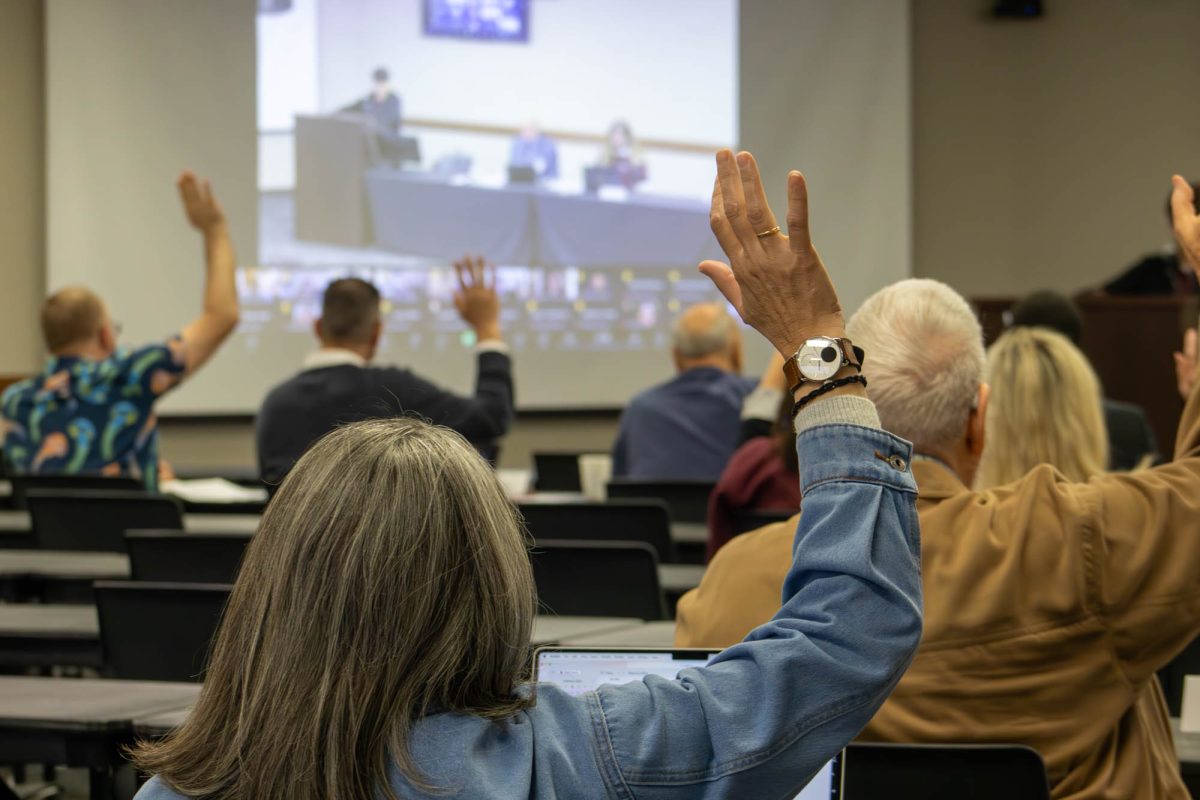The distant world of Tevaria is under threat of imminent destruction. The land is barren and void of any life except Equa, who has just woken up from a long slumber with no memories of her own. With the help of an A&M student and basic calculus, the protagonist has the chance to save the world and find out who she is.
“Variant: Limits,” the first in a series of narrative-driven educational video games based on calculus, is the latest project for Bryan-based video game company Triseum. Triseum was founded in November 2014 by CEO Andre Thomas, a visualization professor and video game industry veteran with experience working with companies like EA and Disney for almost 20 years. Thomas said College Station was the best place to begin Triseum because of Texas A&M’s visualization program.
“I didn’t come here to form a company, I came here to teach and have students,” Thomas said. “When a professor came to me and said she wanted to make a game to help students, I said, ‘Okay, I’ll help her.’ We couldn’t find [a publisher], so the office of commercialization and the college really worked with us and helped us set up a spin-off company so we can get these games out to other students and other schools.”
Weeks after the launch of the pilot program, which invited professors from other universities to teach courses with the PC game, “Variant: Limits” is undergoing tweaks and patches to improve the experience. The main reason “Variant: Limits” was created was the massive amounts of students, especially minority students who do not pass calculus, a core concept of STEM programs, according to Thomas. According to Triseum’s website, failure rates for Calculus I are reaching 38 percent.
According to Thomas, more than 400 professors from 300 different schools have requested “Variant: Limits” and more than 50 are currently using it this semester — with more on the way. Professors can track the students’ progress in the game throughout the semester.
Many of the students who work in the visualization program’s Learning Interactive Visualization Experience (LIVE) Lab, the educational game design training program which Thomas also founded, go on to work at Triseum after graduation.
“It helps; it’s fun and the research is ongoing to see how much it works,” Thomas said. “I always like to work with the best. That’s why I’m here in Aggieland, not at some other school. We have the best students.”
The office, located in Downtown Bryan, houses all components of Triseum, including the artists, programmers and management teams. The staples of most video game studios can be found in the building, including whiteboards on nearly every surface and a game room for inspiration. Although the company is small compared to big-name video game developers, Triseum has already had two published games on the market within three years.
Toni Phillips, the producer of Triseum, said her experience in several areas of video game development, including work on “Star Wars: The Old Republic, helped her balance the Trisuem team as its producer. As an industry veteran, Phillips said it is easier to manage Triseum with so many students — the majority of whom are female — from the LIVE Lab coming in that require less training.
“We’re lucky and unique to be able to have that relationship where other game studios are going to spend a lot of time and money having to incubate, or research and develop, games,” Phillips said. “That kicks off at the LIVE Lab. There’s a unique opportunity for someone who’s been in the industry as long as me to see how this can work so well, to be able to have pre-trained resources that we can just plop right into a role.”
“Variant: Limits” focuses on the limits section of Calculus I courses that its subtitle suggests. Using the structure of a puzzle game, students play the game using knowledge of material taught in class.
Marwan Ansari, director of technology, said now that the game is playable the team is focusing on fixing the highest priority bugs, or errors, in the game.
“We prioritize it based on how big of an impact it’s having,” Ansari said. “Is it preventing students from learning? Is it preventing students from finishing? Is it stopping people from adopting and enjoying the game? From there we put it in priority in terms of how much work is it to fix, how many users does it affect and how quickly we can get it out. And then, we take action.”
Students playing the game aren’t required to physically work out the problems, but rather play the game and use the basic concepts to complete the puzzles. Arte Mecenas, Triseum’s first game, worked in the same way by allowing students to experience art history first-hand as a merchant for the Medici family.
Emily Vincent, Class of 2016, is a concept artist and user interface designer working on “Variant: Limits.” Vincent said her experience in the Visualization Department directly carried over to her work for Triseum.
“Day one I knew what to do because I had already been working on a project for a year and a half,” Vincent said. “Through [visualization] I touched on everything from coding and 2-D art and 3-D art. So I’m able to, hopefully, effectively communicate with the programmers … understanding what they do a little bit helps.”
Elizabeth Stephens, 3-D artist and Class of 2015, uses Houdini and Substance Designer softwares to design and fix parts of the environment in “Variant: Limits.” Although her experience in the visualization program helped her get where she is now, Stephens said working in Triseum is helping her master specific skills.
“Having to be in the workplace 40 hours a week and work on one program definitely helps you develop your skills a lot faster,” Stephens said. “It’s one thing to be in school and work on different projects all semester. It’s another to have one goal for over a year. You level up a lot faster than you do doing little things.”
Phillips said “Variant: Limits” is meant to be a supplement to a calculus course rather than a replacement.
“We have you as a student, who needs to be able to understand the concepts that are being provided to you,”w Phillips said. We need to make sure this is helping you, that what the teacher is saying makes more sense. We’re not just going to put it out there and forget about it either. We’re going to make changes and adjustments because we want the best product possible.”
Triseum will be at SXSW with the university’s Visualization Department to showcase their work and upcoming projects.
Design meets calculus in new game
March 7, 2017
Photo by Photo by Chevall Pryce
3D Artist Rebecca Migl, Andre Thomas, programmer Chase Hardy and Elizabeth Stephens gather around Stephens’ computer to discuss Variant and 3D environments.
0
Donate to The Battalion
$2790
$5000
Contributed
Our Goal
Your donation will support the student journalists of Texas A&M University - College Station. Your contribution will allow us to purchase equipment and cover our annual website hosting costs, in addition to paying freelance staffers for their work, travel costs for coverage and more!
More to Discover









